Home / Technologies / Backend Technologies
Backend
TECHNOLOGIES
Backend Technologies
With powerful, scalable, and flexible backend technologies, you can build a solid foundation for your mobile app or digital portal and ensure a seamless user experience for global users. We offer expertise in the deployment of server-side languages such as PHP, Python, Java, and .Net, along with relational and SQL databases for faster data processing.

1. PHP
PHP (Hypertext Preprocessor) is a server-side scripting language popular in web development. It can be embedded in HTML code and is used to create dynamic and interactive websites. PHP is a popular programming language because it is open-source, which means it is free to use and modify, and it is supported by a large developer community that contributes to its ongoing development.
Key Features :
● It's a server-side scripting language, which means the code runs on the server rather than the user's web browser.
● It is a general-purpose programming language, which means it can be used to create applications other than web-based ones.
● It is an interpreted language, which means that the code is not pre-compiled but rather interpreted by the PHP runtime on the server when it is executed.
● It has a large number of built-in functions and extensions, which means that the core language has a lot of functionality.
2. PYTHON
Python is an interpreted high-level programming language. It is widely used in web development, data analysis, and scientific computing, to name a few applications. Python is well-known for its ease of use and readability, making it an excellent language for beginners.
Key Features :
● The syntax is simple and readable, making learning and writing code simple.
● Because Python is dynamically typed, you don't need to specify the data type of a variable when you declare it.
● Python supports a variety of programming paradigms, including object-oriented, procedural, and functional.
● Python has a large and active community, meaning there are many libraries, frameworks, and resources for use with Python.


3. NODE JS
Node.js is an open-source, cross-platform, JavaScript runtime environment that executes JavaScript code outside a web browser. Node.js lets developers use JavaScript to write command line tools and for server-side scripting—running scripts server-side to produce dynamic web page content before the page is sent to the user's web browser. This allows developers to create server-side applications with JavaScript and take advantage of the many libraries of code written in JavaScript.
Key Features :
● Node.js is available for Windows, Mac OS X, Linux, and Unix platforms.
● The Node.js ecosystem contains many open-source libraries, making it simple to locate and use the modules required to build your applications.
● Node.js is one of the fastest web servers available, making it an excellent choice for developing high-performance applications.
4. APACHE
APACHE is a web server software programme that is commonly used for internet website hosting. It was created in the mid-1990s by a group of volunteers who wanted to create a free, open-source alternative to other web server software programmes available at the time. It is named after the Apache Native American tribe. Both small and large websites widely use APACHE because of its dependability, security, and flexibility. It is also the most widely used web server software programme, powering over half of all websites on the internet today.
Key Features :
● APACHE can be installed on various operating systems, including Linux, Windows, and Mac OS.
● APACHE is known for its ability to handle many concurrent connections and requests.
● APACHE includes several built-in security features to protect websites and users from threats.
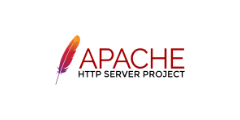
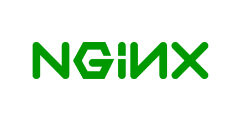
5. NGINX
NGINX is a web server commonly used for static content delivery, request proxying, and load balancing. It is well-known for its high performance, stability, and low resource usage. NGINX is frequently used with other applications or services, such as WordPress or PHP-FPM, to provide a complete web hosting solution.
Key Features :
● NGINX can distribute incoming requests across multiple backend servers.
● NGINX can act as a reverse proxy, forwarding internet requests to your application servers.
● NGINX is highly configurable and can be used for many tasks, including static content delivery, request proxying, and load balancing.
● NGINX is well-known for its dependability and stability, which makes it an excellent choice for mission-critical applications.
6. DOCKER
Docker is a tool for creating, deploying, and running container applications. Containers enable a developer to package an application with all its required components, such as libraries and other dependencies and ship it as a single package. This ensures that the application will run consistently regardless of the environment in which it is running.
Key Features :
● It enables the packaging and execution of applications in a portable container.
● It provides a standardized method for developing, packaging, and distributing applications.
● It enables applications to run independently of one another.
● It offers a simple and robust method for managing and deploying applications.

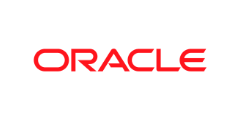
7. ORACLE
Oracle is a database administration system. It is a piece of software used to manage and store business data. Many organizations prefer Oracle because it is a powerful and flexible database management system that can handle many workloads. It is frequently used for storing and managing large amounts of data and is well-known for its dependability and performance. In addition to its database management system, Oracle provides various other data management products and services, such as cloud solutions and business intelligence tools.
Key Features :
● Oracle is well-known for its dependability and capacity to handle various workloads.
● Oracle is built to be scalable, which means it can handle large amounts of data and support many users.
● Oracle provides various security features, such as encryption, authentication, and access controls, to help protect data.
● Oracle can process large amounts of data quickly and efficiently.
8. SQL
Microsoft SQL Server is a database administration system created by Microsoft. It is a popular choice for managing large databases and is used to store and manage data by many businesses and organizations. SQL Server includes several database-related tools and features, such as the ability to create and modify databases, query and manipulate data, and perform complex analyses. It is frequently used in conjunction with other Microsoft products, such as the.NET framework and Visual Studio, to create powerful data-driven applications.
Key Features :
● Many data types, including spatial and XML data, are supported.
● Data management and analysis skills using tools such as SQL Server Analysis Services and SQL Server Integration Services.
● Support for in-memory data processing, allowing for faster data access.
● The ability to create and execute stored procedures, and predefined collections of SQL statements.
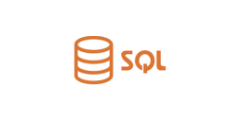

9. MONGO DB
MongoDB is a well-known open-source database management system intended to be scalable and adaptable. It's a document-oriented database, storing information in documents rather than tables with rows and columns. This provides greater flexibility and scalability because the structure of the documents can be changed as needed without modifying the entire database.
Key Features :
● It can store and manage large amounts of data.
● It can query and manipulate data using a simple, flexible query language.
● It can index and search data to improve performance.
● Data replication across multiple servers for increased reliability and performance.
10. MYSQL
MySQL is a popular relational database management system that is open source. It is widely used for data management and storage in various applications and industries and is well-known for its dependability and performance. MySQL is built on Structured Query Language (SQL), the industry standard for relational databases. Users can use SQL statements to create and manage databases and query and manipulate data.
Key Features :
● Support a wide range of data types, including numbers, strings, and dates.
● The ability to create and use indexes to improve database query performance.
● The ability to design and use stored procedures to perform complex data operations.
● Data replication across multiple servers for increased reliability and performance.
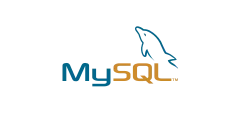

11. POSTGRE SQL
PostgreSQL, also known as Postgres, is a robust open-source object-relational database management system. It is well-known for its stability and dependability and is frequently used in mission-critical applications requiring data integrity and security. Postgres supports a wide range of data types and offers powerful tools for data management and manipulation.
Key Features :
● Many data types, including spatial and JSON data, are supported.
● The ability to create and use indexes to improve database query performance.
● The ability to create and use user-defined functions to extend the database's capabilities.
● Advanced features such as transaction management, concurrency control, and database replication are supported.
12. SQLITE
SQLite is a well-known free and open-source SQL database management system. It is a serverless, transactional SQL database engine that is self-contained. SQLite does not have a separate server process, and all its functions are contained within a single library that can be embedded in an application, unlike many other database management systems. This simplifies its use and integration with other software, allowing it to be used in many applications.
Key Features :
● The ability to store and manage data in a portable and lightweight database.
● The ability to query and manipulate data using SQL Support for a variety of data types, including strings, numbers, and dates.
● The ability to use transactions to ensure data consistency and integrity.
● The ability to create and use indexes to improve database query performance.




